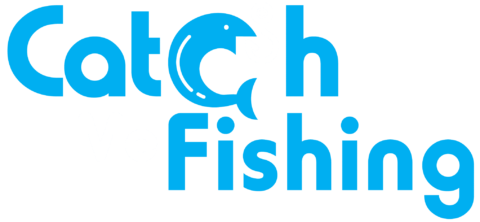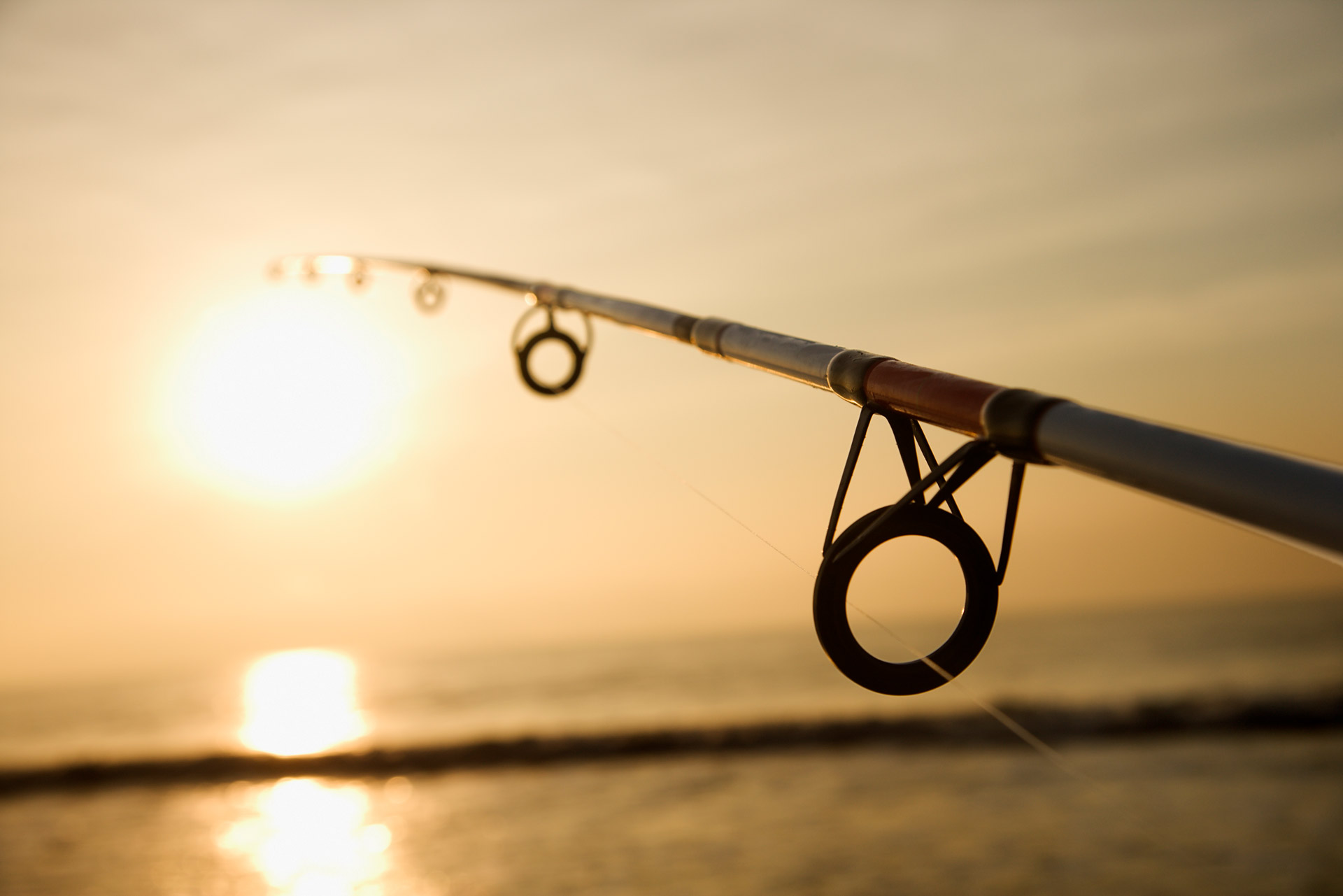What Do Bass Eat? Largemouth, Smallmouth, Striped and White Bass
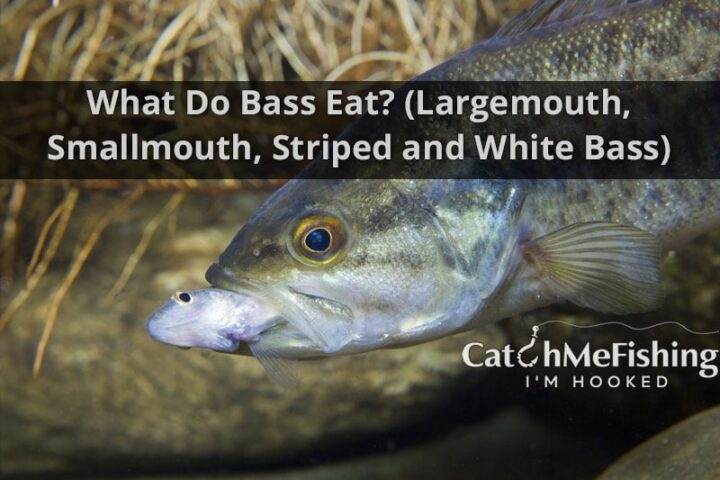
Catching bass is a dream and goal of every bass fisherman, especially popular are trophy-sized bass.
If you are going to fish for bass you should definitely have enough information about the characteristics and life habits of the fish. This way, you’ll get to strategic planning easily. Asking yourself what do bass eat is a way for you to understand the best baits required to have the most successful days fishing for bass.
Understanding what your prey is best provoked by is a big step closer to successful fishing.
Whether you are a beginner or an experienced fisherman, knowing the weaknesses of your prey is always helpful.
What Do Bass Eat?
Let’s now dive deeper into eating habits of different bass, so what do bass eat?
What Do Largemouth Bass Eat?
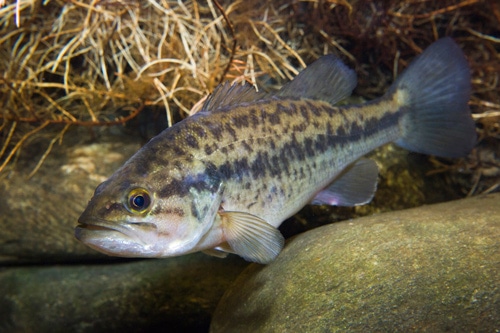
Eating and spawning are the two essential goals for a largemouth bass. They eat pretty much anything that looks like food and is moving attractively.
Some of the best adult largemouth bass food include:
- Fish: perch, shiners, minnows, sunfish, shad
- Small aquatic birds
- Crayfish
- Some of the strangest food big bass eat pretty often are mice, baby ducks, trout
- Snakes and turtles
Younger bass usually prefer:
- Small fish
- Insects
- crustaceans
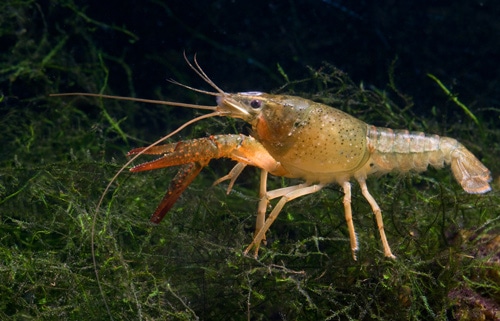
Quite often, largemouth bass are cannibalistic. Big bass target small bass when the survival instinct kicks in.
Bass are generally carnivorous. The best baits for largemouth bass are natural food or artificial lures that perfectly imitate real and alive food for fish. If it’s not moving you’ll find it hard to convince the bass.
In short, Largemouth bass eats everything that can fit in their mouth.
What Do Smallmouth Bass Feed On?
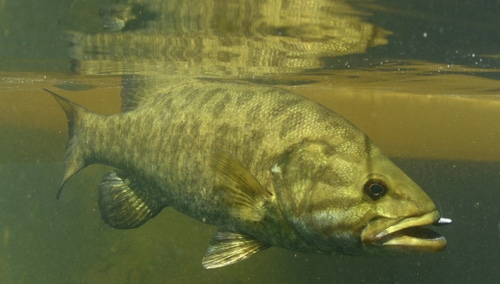
Smallmouth diet is very close to largemouth eating habits. They eat anything they encounter and fit in their mouth. Yes, smallmouth bass has a relatively tight mouth but they are just as aggressive and full of life as largemouth bass and therefore very enjoyable to catch.
Some of the most popular food among smallmouth bass are:
- Frogs
- Worms
- Salamanders
- Minnows, crawfish
What Do Striped Bass Consume?
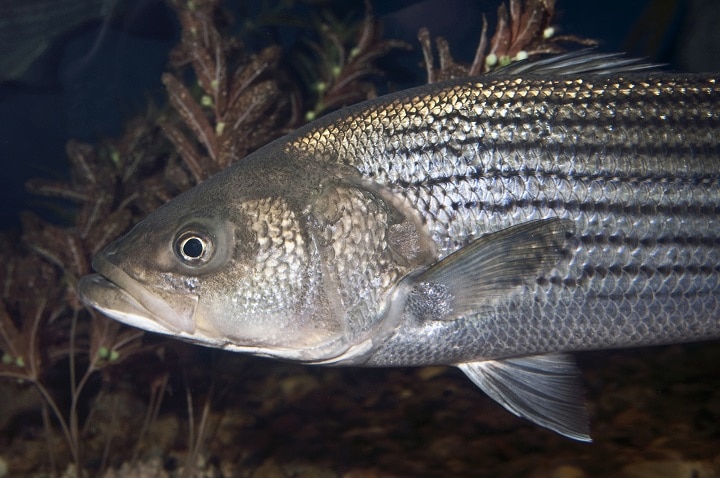
Striped bass is opportunistic fish just like all other bass. They eat what they can, but especially concentrate on smaller creatures.
Striped bass usually eats during the day, but they eat at night time if they find interesting prey.
Some of the most common food striped bass feed on that you could use as baits are:
- Shrimp
- Crabs
- Eels
- Squid
- Mackerel
- Sea herring
- Bunker
- Atlantic menhaden
- Flounders
- Mummichogs
- Soft clams
- Sea worms
- Tomcod
- Sand lance
The simpler question would have been what don’t striped bass eat. Striped bass will be lured by real baits as well as by moving artificial lures.
What Do White Bass Eat?
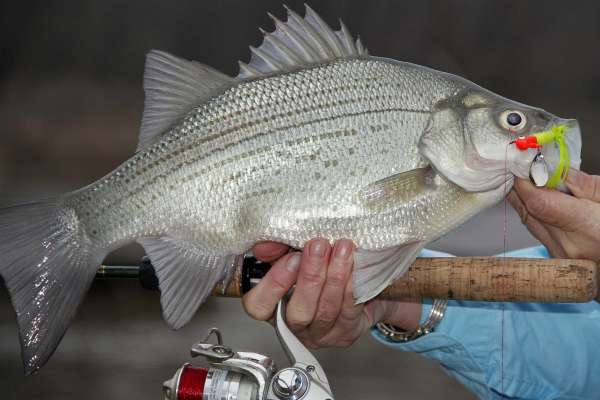
White bass, also known as sand bass, go after smaller food but are very aggressive.
Let’s see what white bass consumes:
- Adult white bass feed on various fish species, such as young sunfish, shad, shiners, silversides, and many others.
- Juvenile white bass eat small invertebrates like midge lavres and small crustaceans.
- Sometimes they also eat worms.
Choosing a lure for white bass is not hard, they’ll be provoked by almost anything that is moving and looks alive.
Seasonal Eating Habits

The best seasons for fishing are spring and summer. Fall and winter are also productive, you just need a different strategy to catch bass.
Bass are most active in spring. So, it’s the easiest to lure them. They don’t eat when they are hungry, they eat when they see an interesting prey to attack.
- Winter: there are fewer opportunities for bass to hunt and eat every other minute. So, they are more passive.
- Spring: as you know, spring is the spawning season for bass. As they settle in their bedding areas, bass eat as much crayfish and shad as possible in order to gain nutrients.
- Summer: after spawning period is over, bass is trying to regain power and eat heavily. They go after frogs, bluegills, and shad.
- Fall: bass try to fatten up for winter in fall, since they will be inactive for a while and prepare as heavily as they can. They eat the same food as in summer but much more heavily.
Bass behavior largely depends on the weather. Warm temperature makes them active, but not too hot. The ideal time is late spring and early summer when it’s cool and a little chilly.
Eating Behavior of Bass in a Pond
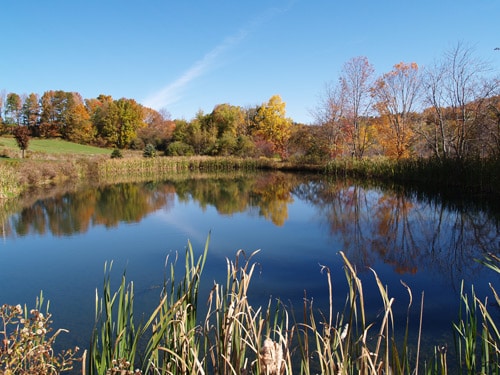
You won’t be surprised if I told you that bass consume anything that moves in ponds.
They mostly eat the fish that is available in their habitat such as shad, herring, bluegills, alewives, crappies. They also enjoy crayfish, snakes, baby ducklings, and baby birds.
Other than that, bass eat each other if they have a problem catching other creatures.
Bass also consume plants but not as food, they just inhale prey with a big force that causes them to eat plants as a side dish 🙂
Bass Feeding Times
Bass are visual hunters. Their main strategy of eating depends on the light and weather.
The best time for bass to hunt is dawn and dusk. Unlike many fish who go after their prey in absolute darkness or bright light, bass prefer the perfect medium between those two.
I would suggest going for bass fishing early in the morning when the sun is about to rise or late at night when the light is already pleasantly dimmed.
Other than the light level, these time periods are best for bass since they are cold-blooded and prefer cooler temperatures.
Best Bass Lures
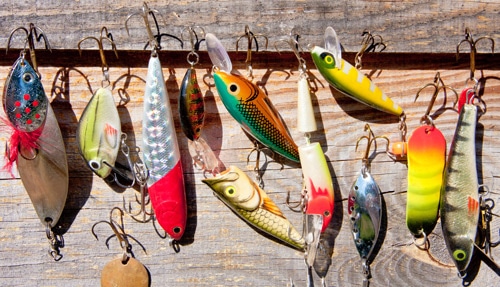
Choosing the right bait is an essential part of fishing. Bass are easily provoked and interested.
There are many artificial lures that look real but now let’s dive into more details about natural baits.
Some of the best baits are:
- Crawfish: crawfish are easy to keep alive to fish for largemouth and smallmouth bass. All kinds of bass love crawfish, so you can’t go wrong with that.
- Bluegills: bass are easily provoked by bluegills, therefore they are one of the most practical baits.
- Baitfish: one of the most popular baitfish is shad. In case the bait dies during fishing, largemouth bass is off-limits, you’ll need to change it to a fresh one to attract bass with an alive moving object.
Frogs, mice, baby ducks, and snakes are great lures but let’s be real, it’s very uncomfortable and even disturbing for some people to hook these creatures. But don’t worry, there is an abundance of artificial lures that perfectly mimic real baits. Check out our 8 Best Crankbaits For Bass Fishing – Ultimate Guide & Review for our in-depth guide on the best crankbaits.
Are You Ready?!
When you ask yourself what do bass eat, you are on the road to becoming a much successful fisherman. Understand the fish you are fishing for is the key to unlocking your fishing potential.
Now that you know bass eating habits and seasonal preferences, it will be easier to have a definite plan of attack.
Strategic planning is a crucial part of fishing if you want to have an enjoyable and fruitful trip.
Choose a bait of your preference or an attractive and colorful lure before going bass fishing and you’ll have trophy-sized bass hooked in no time.
Enjoy your tactical and peaceful fishing experience 🙂


